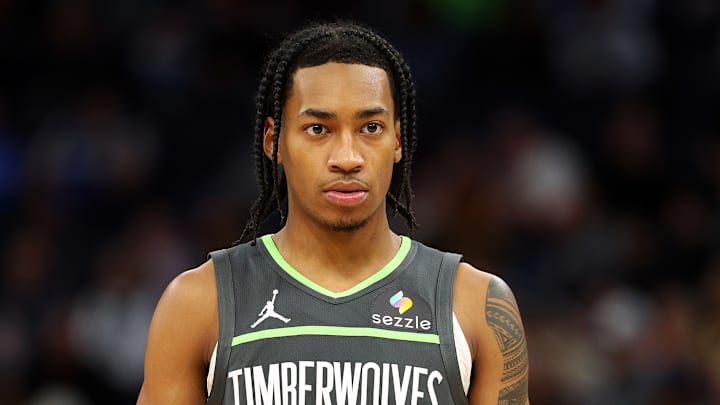Second-year guard Rob Dillingham didn't play much as a rookie, averaging just 10.5 minutes in 49 games. Dillingham's impact is undoubtedly one of the more intriguing parts of the Minnesota Timberwolves' upcoming season. The Kentucky product seems poised for a bigger role with Mike Conley aging and Nickeil Alexander-Walker departing in free agency. Dillingham is a gifted isolation scorer and dazzling playmaker. Regardless, there are concerns with his frame and decision-making.
On a recent episode of the Game Theory Podcast, Sam Vecenie, Bryce Simon & Andrew Claudio went through their over/under predictions for the Western Conference. When discussing the Wolves, Vecenie mentioned how Anthony Edwards will need to play more of a lead guard role, noting his concerns with Dillingham.
"I have my questions about Rob Dillingham, as to whether or not he's going to be able to play minutes for this team, especially in high-leverage situations," Vecenie said.
Vecenie's assessment is certainly reasonable. While Dillingham is a talented player, he played just over 500 minutes last season, and smaller guards tend to take more time to develop. As a result, it's fair to wonder how Dillingham will handle an increased role and if he's viable in playoff settings.
Dillingham's talent is undeniable, but it's unclear what role he'll be able to handle
It's worth noting that Vecenie still took the Wolves over of 49.5 wins, and his concerns were mostly about the team's playoff outlook. There's a lot to like with Dillingham's game; he has blazing speed, fantastic handles, and is a high-level below-the-rim finisher. Notably, Dillingham shot 52.5 percent on drives, a number that was better than anyone in the Wolves' rotation. In many ways, this is the exact skill set the Wolves need in the backcourt.
Nevertheless, whether the 6-foot-1, 175-pound guard can hold up defensively and can be trusted as a lead decision maker for the Wolves is a fair concern. Counting on a second-year guard to play a key role on a championship team is a big risk.
Conley turns 38 before the start of the season. He's the team's main source of playmaking. Despite declining as an overall player, Conley remains an elite offensive organizer. Dillingham is a crafty and versatile playmaker, but it remains unclear if he can organize offense like Conley. Additionally, Dillingham's frame will always make him a target defensively, especially in playoff settings and against elite teams in the regular season.
Currently, Dillingham seems to be positioned as the ninth man in the Wolves' rotation, and on some nights, he might not play at all. With Conley aging and Dillingham perhaps not ready for a bigger role, Edwards could be empowered as more of a lead guard. Similarly, the Wolves will depend on Julius Randle's playmaking abilities more.
Ideally, Dillingham can handle big minutes and help the Wolves fill their point guard void. His gifts as a self-creator make that a possibility. However, the concerns with Dillingham are understandable, and it's far from a guarantee that he'll play big minutes in high-leverage situations.
